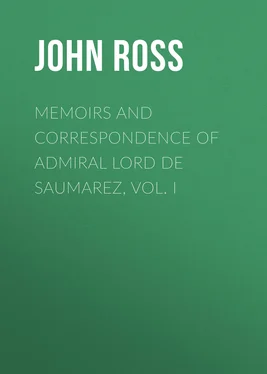John Ross - Memoirs and Correspondence of Admiral Lord de Saumarez, Vol. I
Здесь есть возможность читать онлайн «John Ross - Memoirs and Correspondence of Admiral Lord de Saumarez, Vol. I» — ознакомительный отрывок электронной книги совершенно бесплатно, а после прочтения отрывка купить полную версию. В некоторых случаях можно слушать аудио, скачать через торрент в формате fb2 и присутствует краткое содержание. Жанр: foreign_prose, foreign_antique, на английском языке. Описание произведения, (предисловие) а так же отзывы посетителей доступны на портале библиотеки ЛибКат.
- Название:Memoirs and Correspondence of Admiral Lord de Saumarez, Vol. I
- Автор:
- Жанр:
- Год:неизвестен
- ISBN:нет данных
- Рейтинг книги:3 / 5. Голосов: 1
-
Избранное:Добавить в избранное
- Отзывы:
-
Ваша оценка:
- 60
- 1
- 2
- 3
- 4
- 5
Memoirs and Correspondence of Admiral Lord de Saumarez, Vol. I: краткое содержание, описание и аннотация
Предлагаем к чтению аннотацию, описание, краткое содержание или предисловие (зависит от того, что написал сам автор книги «Memoirs and Correspondence of Admiral Lord de Saumarez, Vol. I»). Если вы не нашли необходимую информацию о книге — напишите в комментариях, мы постараемся отыскать её.
Memoirs and Correspondence of Admiral Lord de Saumarez, Vol. I — читать онлайн ознакомительный отрывок
Ниже представлен текст книги, разбитый по страницам. Система сохранения места последней прочитанной страницы, позволяет с удобством читать онлайн бесплатно книгу «Memoirs and Correspondence of Admiral Lord de Saumarez, Vol. I», без необходимости каждый раз заново искать на чём Вы остановились. Поставьте закладку, и сможете в любой момент перейти на страницу, на которой закончили чтение.
Интервал:
Закладка:
"To Lieut. Saumarez, &c.
It should be mentioned here, that Rhode Island was taken possession of by his Majesty's forces under General Clinton and Sir Peter Parker on the 9th December 1776; and some description of it is necessary to show the arduous as well as perilous nature of the service on which our young hero was now employed. This island takes its name from the province, and lies in Narraganset Bay: it is fifteen miles in length from north to south, and three miles and a half broad; the north end is only three miles from Bristol, to which there is a ferry. The Seakonnet Passage separates it from the main on the north-west side, and the islands of Conanicut and Prudence lie in the passage on the south-east side, the town of Newport being in the south-east part of the island.
The Seakonnet Passage was in consequence of the above order allotted to the Spitfire. Lieutenant Saumarez was now under the orders of Captain Græme, and proceeded to his station: it appears from his journal, now in our possession, that he was constantly on the alert, and almost daily skirmishing with the enemy. On the 24th he had to sustain the attack of three armed boats which came off from Point Judith, and had nearly decoyed them on board; but they found their mistake in time to escape after a good drubbing. On the same evening he joined a detachment of five hundred men, which, under cover of the Flora, had landed above Bristol and burnt one hundred and twenty-five batteaux-plats, an armed galley, and a privateer of fourteen guns, besides destroying the greatest part of the town. On the 30th April a firing was heard in the direction of the Taunton: the Spitfire immediately weighed, and ran over to the enemy's shore, where Lieutenant Saumarez opposed his vessel to a field-piece, which returned his fire without doing any injury for a considerable time; this was meant as a diversion to enable the 54th regiment to attack unobserved, which in the mean time landed up the Taunton, destroyed eight sawmills and several flat-boats, and came off by the assistance of the Spitfire with inconsiderable loss.
On the 1st of May the Spitfire weighed, and was beating against the wind to obtain her station, when, by the vessel missing stays, she got aground on Sandy Hook. On this, the enemy immediately brought down a gun, but without effect. An anchor was carried out; the vessel was hove off without damage, and reached Fogland Battery, off which she anchored, and the next day reached her former station.
It will be needless to notice every occasion wherein the Spitfire was engaged with the enemy, which, while Lieutenant Saumarez commanded her, was no less than forty-seven times! but we shall proceed to the period when his operations in that vessel were drawing to a close. The Americans, who had publicly declared their independence on the 4th July 1776, had concluded a treaty with the French on the 13th March 1778, which was considered by the British government as a declaration of war; and the French ambassador being directed to withdraw, the following orders were issued to the squadron at Rhode Island by Commodore John Brisbane, who had now taken the command:
"By Captain John Brisbane, Captain of H.M.S. Flora, and senior officer of his Majesty's ships and vessels at Newport, Rhode Island.
"In pursuance of an order from the Lord Viscount Howe, vice-admiral of the white, and commander-in-chief of his Majesty's ships and vessels employed on a particular service, you are hereby required and directed to MAKE WAR UPON, take, or destroy any part of the French squadron lately arrived on the coasts of this continent, as well as other ships of war of that nation appearing on the coasts of North America, to the utmost of your ability, until further orders, keeping this secret. Dated on board H.M.S. Flora, at Newport, Rhode Island, 26th July 1778.
(Signed) J. Brisbane."To Lieutenant Saumarez, commanding
the Spitfire, galley."
This order was transmitted with an enclosure, designated "Copy of a paragraph of a letter received from Lord Viscount Howe, dated off Sandy Hook, 19th July 1778."
"As there is not a sufficient naval force for the defence of Rhode Island, and none can be sent while the French squadron, at anchor off Sandy Hook, continues so much superior to that under my command, it may not be unseasonable to remind you that you are at liberty to apply the force under your direction, by landing of guns and men for the service of the batteries; dismantling, and even destroying the ships, to strengthen the defences of the post in the most effectual manner, in case of an attack upon the post, more especially when no longer in prospect of rendering better assistance under the same circumstances, or preventing the capture of the ships.
"Every captain or commander is therefore directed to attend to the foregoing paragraph, and act from circumstances, in the best and most effectual manner possible for the defence of the post, and ship or vessel under his command, so as to answer the intention of his lordship. Dated on board H.M.S. Flora, Newport Harbour, 27th July 1778.
"To Lieutenant Saumarez, commanding
H.M. galley Spitfire."
The French, who had secretly been assisting the Americans, and had long been preparing for war, sent a powerful fleet from France, which arrived, and anchored off Sandy Hook, while Lord Howe was within the harbour with a very inferior force, but could not be attacked: they therefore bent their course to reduce Rhode Island. On the 29th of July they were discovered; and, on the 4th of August, two ships of the line and two frigates entered the passage, where the Kingfisher sloop, the Alarm and Spitfire, galleys, were stationed; and it being no longer possible to prevent them from falling into the hands of the enemy, their stores, guns, and crews were landed, and the vessels set on fire.
CHAPTER III
Serves ashore.—Returns to England in the Leviathan.—Providential escape from shipwreck.—Visits Guernsey.—Joins the Victory.—A journey to London.—Joins the Fortitude.—Battle off the Dogger Bank.—Anecdotes of Admiral Parker.—Mr. Saumarez promoted to the rank of Master and Commander.—Appointed to the Tisiphone.—Sails for the West Indies with Admiral Kempenfelt.—Action with Comte de Guichen.—Captures a French ship of thirty-six guns.—Is despatched to Sir Samuel Hood.—Arrives at Barbadoes.—Escapes from two French men-of-war.—Passes through an intricate channel.—Joins Sir Samuel Hood.—Gallant conduct in cutting out a vessel.—Tisiphone ordered home.—Fortunate exchange with Captain Stanhope.—Takes command of the Russell.
After the destruction of his little vessel, the Spitfire, Lieutenant Saumarez was attached to the division of sailors under Commodore Brisbane, to whom he became aide-de-camp. This division consisted of the crews of the frigates and other vessels which had been destroyed, on the following day in the southern passage, to prevent their falling into the hands of the enemy. The vessels destroyed, in addition to those mentioned in the last chapter, were, the Juno, Lark, Orpheus, and Flora of thirty-two guns, and the Cerberus of twenty-eight.
The artillery and stores had been in part landed, and mounted in various positions on the island; while the seamen and officers, amounting to above a thousand men, were actively employed there during the whole of the siege. Lieutenant Saumarez was stationed latterly in command of one of the advanced posts, and had several opportunities of distinguishing himself in repulsing the repeated assaults of the enemy, and in attacking them in return.
The plans of the French for the reduction of Rhode Island having failed, and their fleet having been dispersed in a storm, during which some were disabled, and others captured, and finally the appearance of Lord Howe with a reinforced but still inferior squadron, induced them to abandon the project, and, after refitting at Boston, to steer for the West Indies.
Читать дальшеИнтервал:
Закладка:
Похожие книги на «Memoirs and Correspondence of Admiral Lord de Saumarez, Vol. I»
Представляем Вашему вниманию похожие книги на «Memoirs and Correspondence of Admiral Lord de Saumarez, Vol. I» списком для выбора. Мы отобрали схожую по названию и смыслу литературу в надежде предоставить читателям больше вариантов отыскать новые, интересные, ещё непрочитанные произведения.
Обсуждение, отзывы о книге «Memoirs and Correspondence of Admiral Lord de Saumarez, Vol. I» и просто собственные мнения читателей. Оставьте ваши комментарии, напишите, что Вы думаете о произведении, его смысле или главных героях. Укажите что конкретно понравилось, а что нет, и почему Вы так считаете.












